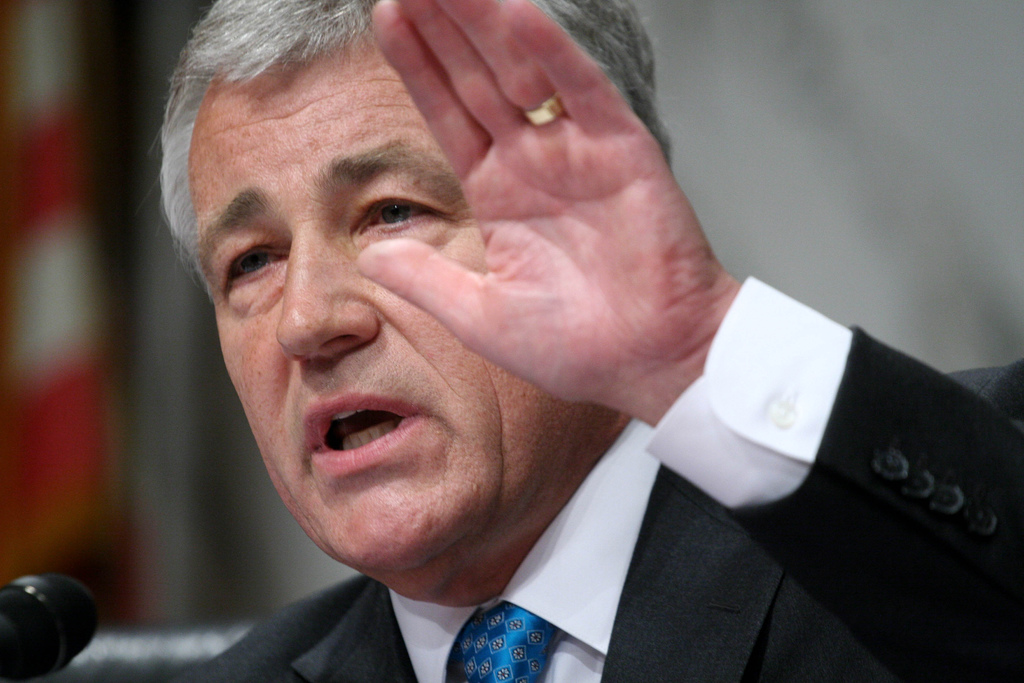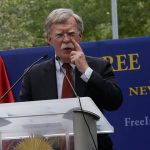I’m pleased that President Obama is reportedly enlarging his list of possible candidates for senior national-security posts to Republicans, notably former Sen. Chuck Hagel, as reported by Josh Rogin, the Cable Guy, on yesterday. As has been pointed out by more than one commentator over the last few years, Obama’s basic foreign-policy views don’t seem all that far from the kind of fundamentally realist views pursued by the administration of President George H.W. Bush, and particularly his two leading advisers, Brent Scowcroft and James Baker — both of whom opposed the Iraq War — not to mention Colin Powell, who served under Bush I as Chairman of the Joint Chiefs of Staff. As I understand it, Obama consults Powell, who will forever regret not standing up to the Cheney-Rumsfeld-neocon cabal, on foreign-policy matters on a not infrequent basis. Moreover, realist Republicans — the bane of neo-conservatives — have always been far more tough-minded about Israel and the distinction between Israeli and U.S. national interests in the Middle East than Democrats. Because Israel and the Middle East are certain to be central to the foreign-policy success or failure of his second term, that kind of tough-mindedness should be especially appealing to Obama. So why Obama would only consider Democrats — and a particularly partisan and polarizing one like Susan Rice — for secretary of state when he has so much on his domestic agenda already has been very puzzling to me. A Republican in tune with Obama’s views could be particularly effective at running interference — especially with Congress — on the foreign-policy front, especially with respect to the Middle East.
Hagel has already been mentioned, but there are other possibilities.
My personal favorite is retiring Indiana Sen. Dick Lugar. As with the Bush I administration veterans, skeptics will immediately cite his age — 80 — as a disqualifying factor, and I understand he does have some minor ambulatory difficulties these days. (Recall, however, that FDR ran the U.S. from a wheelchair for 12 years.) But as is shown by this video of Lugar’s recent acceptance of an award from the Friends Committee on National Legislation — especially after the 15-minute mark when he takes questions — his mind is as sharp as a tack; his knowledge encyclopedic; his access to and interest in foreign leaders impressive; and his concern about the general state of the world, including the have-nots (listen to his discussion about Egypt) seemingly quite genuine.
Described by the New Yorker as “Obama’s favorite Republican,” Lugar defended Obama’s policies during the presidential campaign on Israel, Iran, and China, among other issues, warning back in September that, “We’re really going to have hell to pay,” if the U.S. or Israel carries out an attack against Iran. And given his negotiating skills (his main presentation in that video addresses all the WMD diplomacy he has carried out as follow-through on the 1992 Nunn-Lugar Cooperative Threat Reduction Act), his venerable age and breadth of experience, and invariably civil and engaging demeanor, all but the most rabidly right-wing Republican lawmakers are likely to show deference in his presence.
It is true that Lugar has too often followed his party’s leadership; the worst example, of course, was going along with the Iraq invasion (as did Kerry and Clinton, of course), although he did express pretty strong reservations at the time and became one of the first Republicans to break with Bush’s strategy by calling for a quick withdrawal. (Of course, Hagel was far ahead of him on Iraq). He was also a strong supporter of the most pertinent recommendations of the Iraq Study Group which, of course, was c0-chaired by Baker and Lugar’s fellow-Hoosier, former Rep. Lee Hamilton. I remember back in the 80’s when he defied his party and Ronald Reagan by leading the drive to pass the Comprehensive Anti-Apartheid Act of 1986 and then to override Reagan’s veto. To so flagrantly break with the president was not only politically courageous. It also demonstrated a sensitivity to the aspirations of what was then called the “Third World” that was and remains all-too-rare among Republicans and an understanding that being a foreign-policy “realist” in the late 20th century required factoring popular grassroots movements into the balance-of-power calculations made by governments operating in an international system. His early determination that it made no sense to try to sustain or even reform Marcos dictatorship in the face of the “People Power” movement showed a similar awareness. Moreover, from the early 1980’s, he worked to temper the aggressiveness of Reagan’s Central America policies; in stark contrast to many of his Republican colleagues, his door was always open to human rights, peace, and church groups during the period.
Add to all this Lugar’s consistent support for international treaties and conventions, particularly in the arms control and disarmament field — a major personal priority of Obama’s — as well as his backing for legislation designed to address global warming and climate change, food security, and global health, and Obama would have someone who appears almost entirely in tune with him on just about all of the critical issues he faces in the second term. A highly respected Republican with 36 years in the Senate, most of them on the Foreign Relations Committee — who better to have your back when it comes to dealing with Congress? (An excellent profile of his “legacy” can be found in this National Interest piece by John Shaw.)
There are, of course, other Republicans worth considering. Former Utah Gov. and Obama’s ambassador to China, John Huntsman, certainly falls into the realist camp and would probably make a very effective secretary of state, especially in overseeing the much-ballyhooed “pivot” to Asia. But the fact that he served under Obama, his lack of Congressional ties and experience, as well as his failure to gain any traction for his candidacy in the presidential primary campaign, would likely combine to make him far less persuasive to fellow-Republicans than Lugar. In fact, many Republicans might consider his nomination something of a provocation.
Another Republican worth considering would be former U.S. Trade Representative, former Deputy Secretary of State, and former World Bank President Robert Zoellick, despite his brief association in 1998 with the Project for the New American Century urging the U.S. to adopt regime change in Iraq as its official policy. Aside from that lapse, I have seen virtually no evidence (does anyone have some?) that Zoellick has neo-conservative sympathies. Indeed, neo-cons and aggressive nationalists like John Bolton were pretty upset when Romney appointed Zoellick the head of his transition team. I would wager that Zoellick may have played an important role in persuading Romney to substantially reduce his hawkish rhetoric and stress his agreement with Obama on any number of foreign-policy issues during the third presidential debate. (See Jon Stewart’s hilarious rendition here.)
A protege of Baker during the George H.W. Bush administration, Zoellick is highly, highly competent, as shown by the speed with which he gained the confidence of a World Bank staff demoralized by the petty scandal, seeming cluelessness, and general flakiness of his predecessor, Paul Wolfowitz, who shamelessly rewarded key officials in governments that support the U.S. Iraq invasion with top posts after he took over the Bank. Moreover, Zoellick’s experience at the Bank — dealing with a large multi-national and multi-cultural staff; visiting remote, impoverished regions all over the world; and raising money and other support from emerging economies eager to claim their place at the table — no doubt gave him insights into a far more complex and multi-polar world than most Republicans believe exists. Finally, his deep involvement in international finance and economics almost certainly gave him an appreciation of the limits of U.S. power and the urgency of reducing imperial overstretch of the last couple of decades or more.
Of course, Zoellick is anything but a backslapping pol and, unlike Lugar, Hagel, and Huntsman, has never even run for office. On the contrary, he’s a loner, arrogant, and doesn’t suffer fools gladly, but it may actually be healthy for Republican lawmakers to be on the receiving end of that.
Of course, there are others. On the foreign service professional side, see Robert Wright’s nomination of Deputy Secretary of State William Burns — as well as some of the possible downsides of Kerry — on the Atlantic’s website. If Obama inclines to an older crowd, then diplomat extraordinaire Thomas Pickering, who, among many, many other civic activities, chairs the International Crisis Group, would be fabulous. Pickering, who has served in many key embassies, was most notable for his service as Bush I’s UN ambassador during the Gulf War. He is also a core member of the Iran Project, which, in the eyes of Benjamin Netanyahu and the Israel lobby, probably makes him unacceptable. But Pickering, a former ambassador to Israel, did serve with distinction under Republican, as well as Democratic, administrations.






As long as you are picking octogenarians, why not William R. Polk?
Other non-octogenarians to consider: Chas Freeman who is as qualified as any, and for numerous reasons, even if his nomination would make AIPAC apoplectic. Unfortunately, with Congress in AIPAC’s pocket, his nomination would be dead on arrival unless Obama used some muscle and spent some political capital. As for Powell, are you serious (and is Obama serious about consulting him, unless it is on military matters)? He has a troubled history, and not merely on account of the disaster in Iraq he facilitated (and has never really fessed up to publicly)- or what he may have really known beforehand of what Iraq had offered to the United States. (See, for example, “Extreme Prejudice” by Susan Lindauer.) Notwithstanding his prior confirmation lovefest with Congress, he has has a troubled history of following the party line and keeping his mouth shut in the face of illegality starting as far back as his whitewash investigation of the Mylai Massacre, and that would be certain to resurface. However, Powell’s former Chief of Staff, Wilkerson does have the experience, scope, integrity and gravitas for such a position even if he can’t draw on the Congressional connections that a former Senator might.
As for Huntsman, can you realistically expect Obama to appoint him again when Huntsman used his Ambassadorship to China as a stepping stone to run against the President? Huntsman talks the talk, and has been more realistic in dealing with China than his fellow Republicans, but for a while was also dead set on pursuing a war with Iran. Is he really ready, and would not Bill Clinton veto it- after all, Obama owes Bill a political debt- i.e., to preserve the prize of the Presidency and to campaign for Bill’s wife in 2016, though with Hillary in the race I suspect some Democrats would lean toward her opponent even if it were Huntsman.